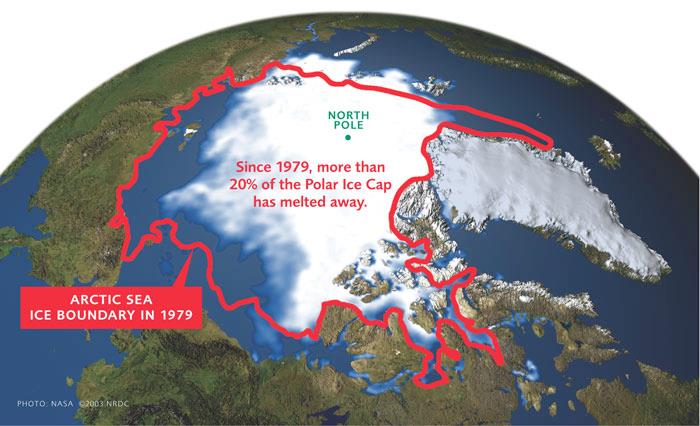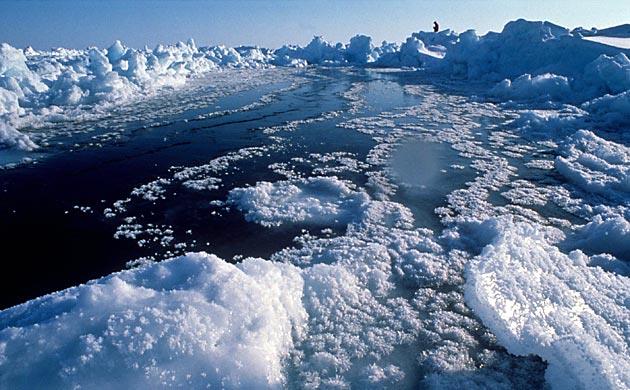The melting Arctic ice cap, directly linked to the process of global warming, is one of the most serious environmental problems facing the planet in the 21st century. This is a well-known fact. However, while environmental groups continue to call for governments to impose carbon taxes in order to reduce their states’ CO2 emissions, exploration of the Arctic resources continues to take place. Canada, Russia, the United States, Denmark, and Norway, among other countries, continue to negotiate their claims to the Arctic region, hoping to get a larger portion of the Arctic Ocean seabed, which contains valuable mineral deposits. As of now, the common language of economic profits helps to maintain stable relations among the nations invested in the region and its development.
Recent research conducted at the Scripps Institution of Oceanography, University of California, San Diego, which studied 30 years’ worth of satellite observations recorded between 1979 and 2011, found that Arctic ice cap is melting twice as fast as previous climate models predicted; it has decreased from 52% to 48% between 1979 and today. Although the study is inconclusive as to why the ice has been retreating at such a fast pace in recent years and suggests that more research is needed to draw conclusive results, it is possible that the increasing feedback of Arctic sea ice retreat on global warming is larger than has been previously suggested.
Information gathered by the Natural Resources Canada (NRCan) and recorded in official federal government documents, supports the above statistics. According to the documents, research conducted in Canada’s High Arctic region shows that the ice cap has been retreating since the late 1980s, with the rate increasing since 2005. Scientists explain this by the fact that since 2005 there has been a “persistent high-pressure system over Greenland, which has acted to draw more warm air from southerly latitudes and contributed to a warming High Arctic.” The main consequence of the melting ice is the rising sea level, which can negatively impact Canada’s coastlines.
Another concern with the shrinking ice cap, according to a study published on Monday, February 17, 2014, in the Proceedings of the National Academy of Science, is the fact that the Arctic is not nearly as white and bright as it used to be. The more the ice melts in the spring and summer, the more the dark waters underneath are exposed to sunlight, and the longer it takes for the ice to freeze again in the fall. With the ice’s reduced capacity to reflect heat back into the atmosphere, the entire planet is absorbing more energy than has been predicted. According to Ian Eisenman, a climate scientist at the Scripps Institute of Oceanography at the University of California, San Diego and the study’s lead author, “the extra energy absorbed is so big that it measures about one-quarter of the entire heat-trapping effect of carbon dioxide.”
While the findings are troubling from an environmental point of view, some are taking advantage of hidden business opportunities as the ice cap continues to decrease. For example, Japanese firms, including Inpex Corp., are exploring opportunities for more efficient oil and gas transit from the Arctic region. For these firms, the melting ice not only allows better access to natural resources, but also facilitates better transit opportunities through new shipping routes. Last December Inpex Corp. acquired oil-drilling rights to two offshore sites near Greenland and the company hopes to have a better opportunity of exploring the region’s untapped resources with the ice cap retreating further and for longer periods of time. This can prove to be a wise investment as the Arctic, including the Ocean seabed, is estimated to have 30% of the world’s undiscovered natural gas deposits and 13% of the world’s untapped oil reserve, according to 2008 US Geological Survey.
However, as states and private companies continue to vie for the mineral wealth of the Arctic territory, it is important to remember the negative environmental effects of the decreasing ice cap. As recent studies prove, the ice is retreating at a much quicker pace than initially thought. This will continue to reflect in changing climate and weather patterns all over the world, threatening both coastlines and inlands. As a group of European scientists and researchers warns, the melting ice cap is an “economic time bomb” that will cost approximately $60 trillion or more over the next 10 years. This number approaches the $70 trillion value of the entire world economy in 2012. The estimate is based on calculations of costs involved in managing more frequent environmental disasters, which are likely to take place as a result. They encourage the global community to develop an economic model of the impacts of global warming in order to reevaluate how states approach the issue. Thus, the natural resources located in the Arctic region may simply not be enough to balance the global budget against the expenses of more frequent and severe natural disasters, which are a very real possibility in the future.



